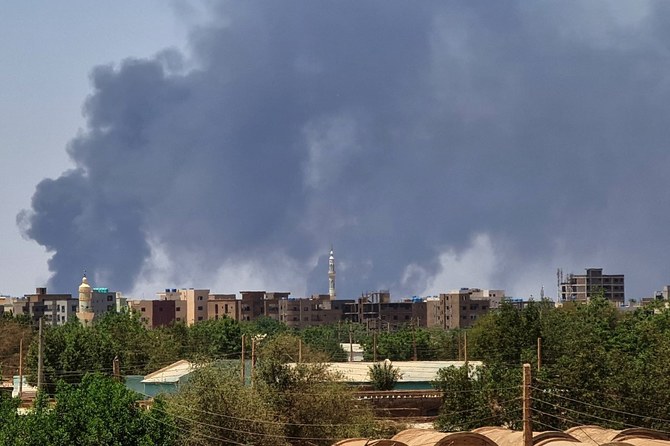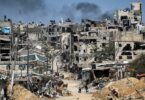Ali Mohamed Ahmed Osman
The international community needs to understand the reality of military confrontations in Sudan and take note of the heinous crimes against humanity committed by the mutineer Rapid Support Forces. Since April 15, the RSF has been committing grave atrocities against civilians, diplomats and public amenities. To put the crisis into perspective, it is important to look into how this militia came into existence and why it became a threat to the survival of Sudan.
The issue of integrating the RSF into the national army has been a contentious one since the signing of the Framework Agreement on Dec. 5, 2022. The RSF leadership insisted on remaining a separate army parallel to the Sudanese Armed Forces for at least 10 years, while the military wanted to complete the merger within two years. The RSF, in an act of defiance, began to mobilize large numbers of its forces without the approval of or coordination with the military command. On April 13, the Sudanese army warned against the deployment of the RSF in the capital Khartoum and the town of Merowe without its consent. On April 15, the RSF began an unprovoked attack on the residence of Gen. Abdel Fattah Al-Burhan, the president of the Transitional Sovereign Council and commander-in-chief of the Sudanese Armed Forces, which is located within the headquarters of the General Command of the Armed Forces. This is clear evidence of the premeditated plan by the RSF and its leader, Gen. Mohammed Hamdan Dagalo, who is known as Hemedti, to seize power and take control of the national army. The army was left with no option but to respond with full force to the aggressors, driven by their national duty and responsibility to provide security for the population. Al-Burhan has issued a decree to dissolve the RSF due to its insurgency, declaring it an anti-state rebel group that will be dealt with on that basis.
Due to its lack of sufficient training in the fields of international humanitarian law and the internationally agreed rules of engagement, and in light of its hasty and massive enlargement, the mutineer RSF has committed an incredible number of serious violations against civilians. Here are just a few examples: Detaining the families of senior officers, state officials and university professors as hostages and using them as human shields. At Khartoum Airport, the RSF attacked civilian aircraft and passengers, killing some and taking others hostage. It occupied hospitals and turned them into military bases, forcing medical staff to treat their wounded fighters while ignoring ordinary patients. Breaking into citizens’ homes and expelling them in order to use the buildings for military purposes, while detaining the residents as human shields and using rooftops as sites for snipers – these were seen as military victories, with the RSF falsely claiming they were the residences of members of the Transitional Sovereign Council. Militia members stole citizens’ cars and private property. They established random and illegal checkpoints, targeting certain groups of citizens, confiscating government vehicles and kidnapping and killing medical staff. The RSF looted banks, stores and private and public companies, occupied hotels, clubs, halls and police stations, and attacked prisons and released detainees. And the group targeted basic service centers, such as water, electricity and communications stations, hospitals and an oil refinery with the intentional strategy of inflicting maximum suffering on civilians.
Though protected by international law and the Vienna Convention on Diplomatic Relations, diplomatic missions in Khartoum have not been exempt from the mutineer RSF’s atrocities. Its militiamen assaulted the EU ambassador in his residence, attacked the French Embassy evacuation convoy, killed the assistant administrative attache at the Egyptian Embassy, shot at a US Embassy vehicle, and assaulted the Malaysian ambassador and stole his car. Other attacks on diplomatic missions, including the shooting of bullets at the Indian Embassy, have been reported. Rebel militia forces have reportedly been stationed near several embassies. As a result of these irresponsible acts, the humanitarian situation has deteriorated, especially in parts of the capital. The clashes have caused a large number of civilians to move from their homes to other, safer cities and regions in Sudan. Living conditions in general have also worsened due to food shortages, insecurity and the lack of medical supplies, electricity and potable water.
Currently, as the government observes the latest ceasefire, the relevant authorities in Sudan are working tirelessly to improve the humanitarian situation by providing assistance to those affected, restoring and improving basic services such as healthcare, electricity and drinking water, and enhancing security. It is pertinent to indicate that the government of Sudan, including the Sudanese Armed Forces, has taken serious and pivotal measures to address the humanitarian suffering since the first day of the confrontations. These measures include: The adoption of a combat strategy aimed at minimizing casualties and damage among civilians and private and public properties, even if this delays the complete defeat of rebel forces; Al-Burhan issuing a decision pardoning all officers and soldiers of the RSF who lay down their arms; and the army, in cooperation with various national institutions, including the Ministry of Foreign Affairs, successfully evacuating foreign nationals and diplomatic missions from more than 40 countries.
I would like to conclude by quoting a Foreign Policy article by Yasir Zaidan, which was published last week: “The best outcome of the ongoing war would be the Sudanese Armed Forces eliminating the RSF to prevent a second Somali scenario – where militants have long vied with the state for control – in a volatile region. Therefore, the international and regional actors should avoid addressing the fight in Sudan as a fight between two generals. Instead, it is a fight between the remains of national state institutions against a tribal, corrupt militia founded by the Bashir dictatorship.” This is obviously in line with the Japanese initiative for a Free and Open Indo-Pacific, of which Sudan is an integral part.







